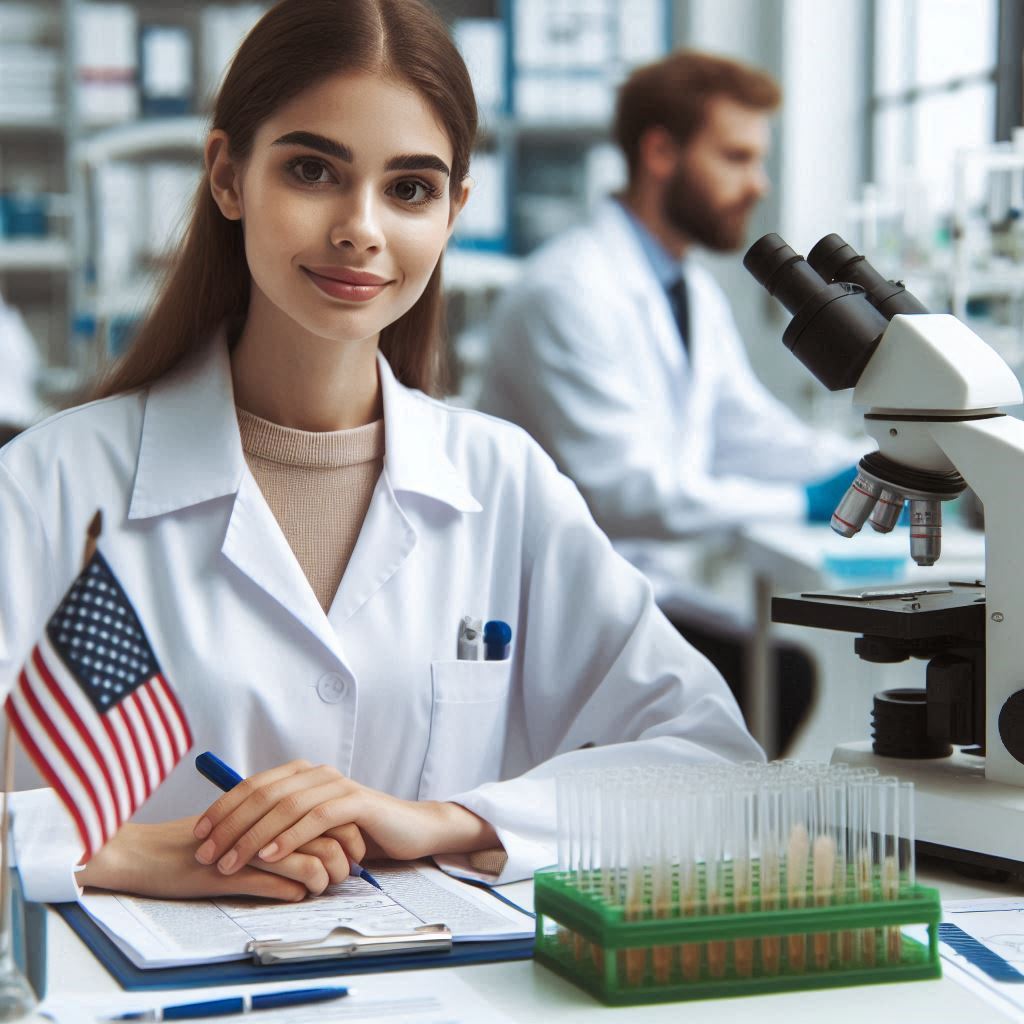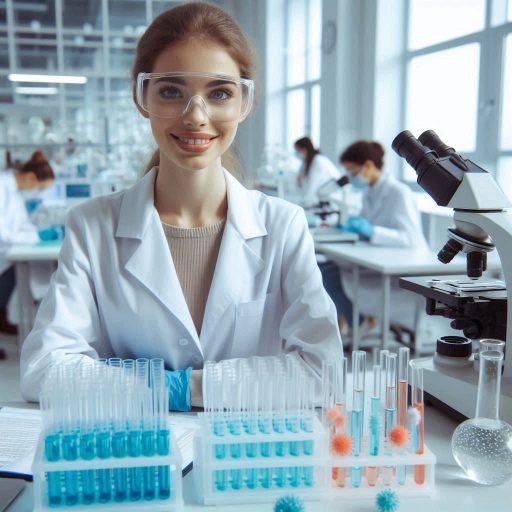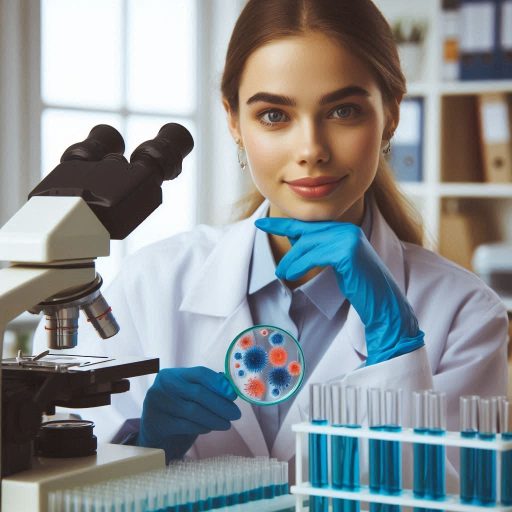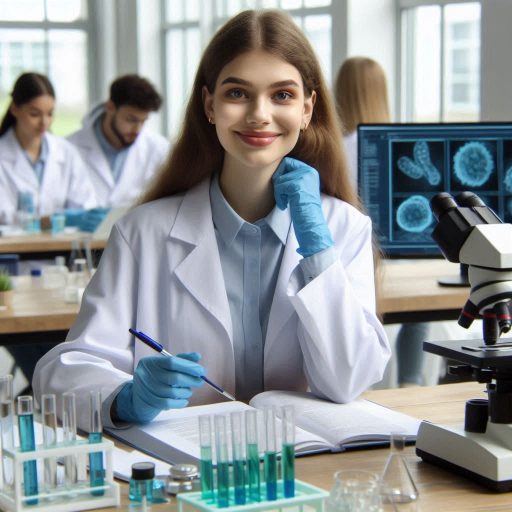Introduction
Microbiologists play a crucial role in the pharmaceutical industry.
They specialize in studying microorganisms, including bacteria, fungi, and viruses.
Their expertise is essential in drug development, quality control, and safety assessments.
By understanding how microorganisms function, microbiologists help ensure the efficacy and safety of pharmaceutical products.
Microbiologists contribute significantly to various phases of drug development.
They assist in identifying potential microbial contaminants during the manufacturing process.
This vigilance helps maintain the integrity of pharmaceutical products.
Moreover, microbiologists develop and implement testing protocols to detect these contaminants efficiently.
They play a vital role in ensuring that the medications are safe for public use.
In the pharmaceutical industry, microbiologists conduct research that drives innovation.
They study microorganisms to discover new drugs and therapies.
This research leads to the development of antibiotics, vaccines, and other life-saving medications.
By exploring microbial interactions, they can identify compounds that have therapeutic potential.
This work is essential in combating infectious diseases and improving patient outcomes.
Quality control is another critical area where microbiologists excel.
They perform rigorous testing to ensure that pharmaceutical products meet regulatory standards.
This includes evaluating the sterility of products and assessing microbial load.
Microbiologists also monitor environmental conditions in manufacturing facilities to prevent contamination.
Their diligence protects consumers and upholds the reputation of pharmaceutical companies.
Key Role 1: Research and Development
Microbiologists play a vital role in pharmaceuticals, especially in research and development.
They contribute significantly to drug discovery by exploring microorganisms’ properties.
These scientists study bacteria, fungi, and viruses to identify potential drug candidates.
Their research helps uncover new compounds that can treat various diseases.
How Microbiologists Contribute to Drug Discovery
Microbiologists contribute to drug discovery by isolating and characterizing microbial species.
They use advanced techniques to identify natural products with therapeutic potential.
By studying the interactions between microorganisms and human cells, microbiologists uncover novel mechanisms for drug action.
Their research into microbial metabolites often leads to the development of new medications.
The Importance of Research in Pharmaceuticals
Research in pharmaceuticals is crucial for developing effective medications.
It involves rigorous testing, analysis, and validation of findings.
Microbiologists enhance production processes by optimizing fermentation techniques to increase yields of active compounds.
This optimization ensures that pharmaceuticals are produced efficiently and cost-effectively.
Furthermore, microbiologists develop quality control protocols to maintain drug safety and efficacy.
Their expertise ensures that pharmaceutical products meet regulatory standards.
Examples of Successful Drug Developments Led by Microbiologists
One example of successful drug development led by microbiologists is the discovery of penicillin.
Alexander Fleming’s work with the mold Penicillium notatum revolutionized medicine.
This antibiotic has saved countless lives since its introduction.
Another notable example is the development of the immunosuppressant drug cyclosporine.
Researchers isolated it from the fungus Tolypocladium inflatum.
This drug has transformed organ transplantation by preventing rejection.
Microbiologists also contribute to vaccine development.
They study pathogens to understand their biology and identify potential targets for vaccines.
For instance, research on the bacterium Bordetella pertussis led to the development of the whooping cough vaccine.
This work has significantly reduced disease incidence worldwide.
Additionally, microbiologists investigate antibiotic resistance.
They study how bacteria adapt and develop resistance to existing drugs.
This research is critical for developing new antibiotics and treatment strategies.
By understanding resistance mechanisms, microbiologists help ensure the continued effectiveness of antibiotics.
The role of microbiologists in pharmaceuticals is indispensable.
Their contributions to research and development drive innovation in drug discovery.
The successful development of drugs and vaccines showcases their expertise.
As the pharmaceutical landscape evolves, microbiologists will remain at the forefront.
Their work is essential for tackling emerging health challenges and improving patient outcomes.
In fact, microbiologists play a key role in pharmaceuticals through research and development.
Their efforts in drug discovery, optimization, and safety contribute to advancements in medicine.
As we face new health challenges, their expertise will continue to be invaluable in the quest for effective therapies.
Read: U.S. Cities with the Most Opportunities for Environmental Scientists
Key Role 2: Quality Control
Microbiologists play a crucial role in ensuring the quality of pharmaceutical products.
They focus on product safety and efficacy throughout the manufacturing process.
Their expertise helps detect and eliminate potential contaminants, protecting consumers and maintaining the integrity of pharmaceutical products.
Overview of How Microbiologists Ensure Product Safety and Efficacy
Microbiologists conduct various tests to assess the quality of pharmaceutical products.
They perform microbial testing to detect harmful bacteria and fungi.
They also evaluate the sterility of products and their components.
Additionally, they analyze raw materials to ensure they meet regulatory standards.
These tests help identify any deviations from quality specifications.
Importance of Quality Control in Pharmaceutical Manufacturing
Quality control in pharmaceutical manufacturing is essential for several reasons.
First, it ensures that products meet safety standards.
Second, it guarantees that medications are effective for patients.
Quality control processes also help prevent costly recalls and legal issues.
Therefore, microbiologists are vital in maintaining high-quality standards in the industry.
Regulatory Requirements for Quality Control in Pharmaceuticals
Regulatory requirements for quality control in pharmaceuticals are strict and comprehensive.
Organizations like the FDA establish guidelines that manufacturers must follow.
These regulations dictate how microbiologists should conduct testing and validation processes.
Compliance with these regulations helps ensure that products are safe and effective.
Moreover, microbiologists must document their quality control processes meticulously.
This documentation provides a traceable record of testing results and compliance.
It also serves as evidence during inspections by regulatory agencies.
By maintaining accurate records, microbiologists contribute to the overall credibility of the pharmaceutical industry.
In addition to regulatory requirements, microbiologists also implement Good Manufacturing Practices (GMP).
These practices outline the necessary procedures and conditions for producing safe pharmaceuticals.
Microbiologists ensure that manufacturing environments are sterile and free from contaminants.
They monitor equipment and facilities to maintain the highest hygiene standards.
Collaboration between microbiologists and other departments is crucial for effective quality control.
They work closely with production, research, and regulatory affairs teams.
This collaboration ensures a holistic approach to product quality and compliance.
Most importantly, microbiologists play a vital role in quality control within the pharmaceutical industry.
Their efforts help guarantee product safety and efficacy, which are paramount for patient health.
By adhering to strict regulatory requirements and implementing GMP, microbiologists contribute to a reliable pharmaceutical supply chain.
Their work not only protects consumers but also enhances the overall reputation of the pharmaceutical industry.
Through their expertise, microbiologists help ensure that every medication delivered to patients meets the highest quality standards.
Read: Environmental Scientist vs. Ecologist: Roles and Differences in the US

Learn More: Marine Biologist Collaboration with Other Scientists
Explore Further: How to Become an Immunologist: Step-by-Step Guide
Key Role 3: Drug Formulation
Microbiologists play a crucial role in drug formulation within the pharmaceutical industry.
They apply their expertise in microorganisms to develop effective medications.
Their knowledge ensures that drugs maintain efficacy and safety during storage and use.
How Microbiologists Help in Formulating Drugs
Drug formulation involves designing a medication’s physical and chemical characteristics.
This process determines how a drug is delivered, absorbed, and utilized by the body.
Microbiologists study the interactions between active ingredients and excipients.
They optimize formulations to enhance drug stability and effectiveness.
Microbiologists also assess how microorganisms affect drug formulations.
They analyze how microbial contamination can compromise drug safety.
By understanding these interactions, they can develop preservatives and stabilizers to prevent contamination.
This ensures that drugs remain safe and effective for consumers.
Importance of Drug Formulation in Pharmaceuticals
The importance of drug formulation cannot be overstated.
A well-formulated drug maximizes therapeutic effects while minimizing side effects.
Poorly formulated drugs can lead to treatment failures, increased costs, and health risks.
Therefore, microbiologists focus on creating formulations that enhance drug performance.
Examples of Drug Formulations Improved by Microbiologists
One example of successful drug formulation involves vaccines.
Microbiologists design vaccines to ensure stability and potency.
They select appropriate adjuvants that enhance immune response.
These innovations lead to effective vaccines that protect against various diseases.
Another example is the development of antibiotic formulations.
Microbiologists work to create stable formulations that improve antibiotic delivery.
They ensure that these medications remain potent during transport and storage.
This leads to more effective treatments for bacterial infections.
Additionally, microbiologists contribute to formulating biopharmaceuticals, such as monoclonal antibodies.
They optimize these complex molecules for stability and efficacy.
Their work enhances the therapeutic potential of these life-saving medications.
Microbiologists also focus on developing formulations for personalized medicine.
They study individual patient responses to medications and tailor formulations accordingly.
This approach leads to more effective treatments with fewer side effects.
In recent years, microbiologists have played a vital role in developing probiotic formulations.
They identify beneficial strains of bacteria and formulate them for specific health benefits.
These formulations support gut health and improve overall well-being.
In short, microbiologists significantly impact drug formulation in the pharmaceutical industry.
Their expertise ensures that medications are safe, effective, and reliable.
By improving drug formulations, they enhance patient outcomes and contribute to public health.
Their work highlights the essential connection between microbiology and pharmaceuticals.
As drug development continues to advance, the role of microbiologists will remain crucial in shaping the future of medicine.
Read: The Relationship Between U.S. Policy & Environmental Scientist Roles
Key Role 4: Testing and Validation
Microbiologists play a critical role in testing and validating pharmaceutical products.
They ensure that medications are safe and effective for consumer use.
These professionals conduct rigorous tests on various products throughout the development process.
Their work involves evaluating raw materials, intermediates, and finished products.
How Microbiologists Conduct Tests to Validate Pharmaceutical Products
During the testing phase, microbiologists assess the presence of harmful microorganisms.
They perform sterility tests to ensure products are free from contaminants.
This step is essential for products like injectables and other sterile formulations.
Any contamination can lead to serious health risks for patients.
Thus, microbiologists develop and implement standard operating procedures (SOPs) for testing.
Microbiologists also conduct stability testing to evaluate how products maintain quality over time.
This testing assesses how factors like temperature, light, and humidity affect product integrity.
By conducting these tests, microbiologists ensure that pharmaceutical products remain effective until their expiration dates.
They work to establish proper storage conditions to maximize product shelf life.
Transform Your Career Today
Unlock a personalized career strategy that drives real results. Get tailored advice and a roadmap designed just for you.
Start NowThe Significance of Testing for Product Reliability
The significance of testing for product reliability cannot be overstated.
Reliable pharmaceutical products build trust among healthcare providers and patients.
Microbiologists help to uphold this trust by providing thorough testing data.
They ensure that every product meets established quality standards.
This commitment to quality is crucial for regulatory approvals and market success.
Microbiologists utilize various techniques to validate products.
They may use culture-based methods to detect microbial contamination.
Additionally, they employ advanced molecular techniques for more precise testing.
These methods help microbiologists identify specific pathogens and assess their resistance to antibiotics.
Such insights are invaluable in developing effective treatments.
The Role of Microbiologists in Ensuring Product Effectiveness
Furthermore, microbiologists contribute to the development of quality control measures.
They establish testing protocols and guidelines to monitor manufacturing processes.
This proactive approach ensures that potential issues are identified early.
It helps maintain product quality throughout the production cycle.
Microbiologists also play a role in post-market surveillance.
They monitor the performance of pharmaceutical products after they are released to the market.
This ongoing evaluation helps identify any emerging safety concerns.
By conducting investigations and assessments, microbiologists can recommend necessary actions to address these issues.
In summary, microbiologists conduct extensive testing and validation of pharmaceutical products.
Their work ensures the safety, efficacy, and reliability of medications.
By employing various testing techniques, they protect public health and enhance the reputation of the pharmaceutical industry.
Their dedication to quality assurance is vital in delivering effective treatments to patients.
Read: Organizations & Associations for Environmental Scientists in the USA
Discover More: Skills Needed for Marine Biology Careers
Conclusion
Microbiologists play vital roles in the pharmaceutical industry.
Their expertise shapes the development, production, and safety of pharmaceutical products.
They ensure the quality and efficacy of medicines through rigorous testing and analysis.
Their work supports the creation of safe and effective vaccines and therapeutics.
In drug development, microbiologists contribute significantly to understanding microbial interactions.
They help identify potential contaminants that could compromise drug safety.
Their knowledge guides researchers in formulating drugs with optimal stability and effectiveness.
Microbiologists also play essential roles in biopharmaceutical production, including recombinant proteins and monoclonal antibodies.
They optimize production processes to enhance yield and quality.
Moreover, microbiologists conduct crucial research on antimicrobial resistance.
This research is essential for developing new antibiotics and treatment strategies.
Their work aids in combating emerging infectious diseases and protecting public health.
In quality control, microbiologists ensure that pharmaceutical products meet stringent safety standards.
They perform tests to detect pathogens and verify the absence of harmful microorganisms.
This quality assurance helps maintain consumer trust in pharmaceutical products.
[E-Books for Sale]
The Big Book of 500 High-Paying Jobs in America: Unlock Your Earning Potential
$19.99 • 500 High-Paying Jobs • 330 pages
Explore 500 high-paying jobs in America and learn how to boost your career, earn more, and achieve success!
See All 500 High-Paying Jobs of this E-Book
1001 Professions Without a Degree: High-Paying American Jobs You Can Start Now
$19.99 • 1001 Professions Without a Degree • 174 pages
Discover 1001 high-paying jobs without a degree! Unlock career tips, skills, and success strategies for just $19.99!




